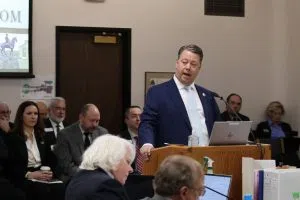 (Amy Dalrymple – North Dakota Monitor) – A North Dakota legislative committee gave unanimous support Friday for a bill that would dedicate $15 million to replace Chinese-made drones used by state agencies.
(Amy Dalrymple – North Dakota Monitor) – A North Dakota legislative committee gave unanimous support Friday for a bill that would dedicate $15 million to replace Chinese-made drones used by state agencies.
House Bill 1038 also would invest $11 million to advance North Dakota’s Vantis network, which is working to make it possible for drones to operate safely over long distances.
Nearly 90% of the drones used by North Dakota agencies and higher education campuses were manufactured in China, according to legislative research. Most were manufactured by Da Jiang Innovations, or DJI, which the Department of Defense has warned poses potential threats to national security.
Bill sponsor Rep. Mike Nathe, R-Bismarck, said his proposal would allow agencies to replace about 300 state-owned drones with devices that comply with the National Defense Authorization Act. The one-time funding also would pay for training and disposal of the old drones.
Trevor Woods, executive director of the Northern Plains Unmanned Aircraft Systems Test Site, told lawmakers that while Chinese-made drones are user-friendly, there are growing concerns about threats to privacy, control of data and safety.
“A lot of these drones fly because they’re connected to a server in China that are active in real time,” Woods said. “We don’t really know exactly what’s being done with that data and how that data is being mined for information.”
Another concern is that software and firmware on the drones can be updated automatically without the user’s knowledge, Woods said. That could cause drones to stop functioning during a critical response situation, such as wildfire monitoring or search and rescue effort, Woods said.
Under the bill, agencies can continue using their current drones until replacement devices are purchased and staff are trained, Nathe said. The replacement program would be administered through the Department of Commerce and the Northern Plains UAS Test Site.
Members of the House Appropriations Committee questioned what impact the bill would have if private companies and individuals continue using drones manufactured by foreign adversaries.
Nathe said future federal legislation may address privately owned drones, but the bill aims to upgrade devices used by state agencies.
A second part of the bill aims to keep North Dakota as a leader in the UAS industry, Nathe and other supporters said.
Erin Roesler, deputy executive director of the Northern Plains UAS Test Site, said the industry lacks infrastructure such as an air traffic control system, requiring drone users to develop their own communication, navigation and operational systems.
“That approach is costly, inefficient, and really limits the broader integration and adoption of this drone technology,” Roesler said.
The Vantis network is working to bridge that gap and develop shared-use infrastructure for the drone industry, she said.

The $11 million in one-time funding would support what’s known as the Radar Data Pathfinder Program. Vantis is working to integrate Federal Aviation Administration surveillance data, greatly expanding the radar coverage in North Dakota. But first the network will need to invest in cybersecurity systems, high-level training and other security measures.
“That initiative represents a groundbreaking opportunity for the state of North Dakota, not just to lead, but to define the next set of rules and regulations at the federal level in supporting UAS operations,” Roesler said.
The long-term goal is that Vantis will provide a return on investment to North Dakota by working with other states that also want access to the shared-use infrastructure.
Rep. Glenn Bosch, R-Bismarck, pushed for more information about when the state would start to see that return on investment.
Rep. David Richter, R-Williston, pointed to other potential benefits to North Dakota, such as enabling the oil and agriculture industries to more effectively use drones and making it possible to deliver medications to rural areas.
“I just see so many applications that it can be utilized within the state and benefit the people that live here,” Richter said.
Gov. Doug Burgum included the $26 million in his budget recommendation before leaving office, urging lawmakers in his December budget address to fast-track the bill. Gov. Kelly Armstrong and Lt. Gov. Michelle Strinden also support the bill for national security reasons and to maintain North Dakota’s leadership in the UAS industry, policy director Aaron Weber told lawmakers.
The bill is being expedited and expected to go before the House next week.









